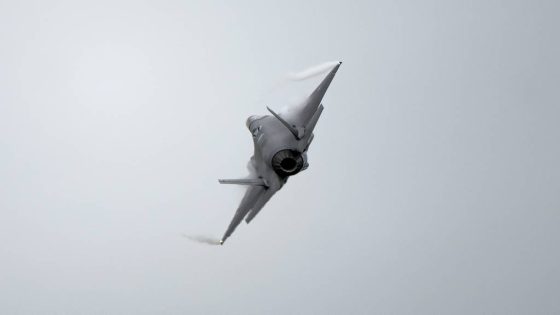PARIS â Denmark plans to bring home its six F-35 Joint Strike Fighters currently being used to train pilots in the U.S. as the delivery schedule for an upgraded version of the aircraft continues to slip.
The six Danish F-35 jets in TR-2 configuration stationed at Luke Air Force Base in Arizona will be repatriated to the Royal Danish Air Forceâs Skrydstrup air base, the Defence Ministry said in a statement on Wednesday. Theyâll join the four stealth fighters already there to bring the countryâs operational F-35s to ten, as Denmark prepares to phase out its fleet of F-16 jets.
Lockheed Martin is running out of space to park undelivered F-35 jets amid hardware and software delays linked to the Technology Refresh 3 update, or TR-3, whose full delivery will be delayed into 2025, the U.S. Government Accountability Office reported in May. Thatâs disrupting fleet-replacement plans by the likes of Denmark, Belgium and Norway, whose F16s have been flying for more than 40 years, and whose fleets are counted in dozens of aircraft rather than hundreds.
âItâs very positive that we have now found a solution, so that the delays from the manufacturer affect us as little as possible,â Defence Minister Troels Lund Poulsen said in the statement. âF-35 fighter jets are a major investment for Denmark that will be important for our defense and security for many years to come, and itâs crucial that we follow the phase-in closely.â
The TR-3 software, originally planned for summer 2023, continues to be unstable, the GAO reported in May, with the watchdog saying some test pilots had to reboot their entire radar and electronic-warfare systems mid-flight to get them back online. The update includes improved cockpit displays and more on-board computing power, and is supposed to serve as the basis for a further upgrade known as Block 4 that adds new weapon and electronic-warfare capabilities.
Lockheed Martin will initially deliver F-35 jets with a limited version of TR-3 that can only be used for training purposes, Denmark said. The Danish jets in the older TR-2 configuration will be repatriated as aircraft with the TR-3 software and hardware upgrade are delivered to Luke Air Force Base, the Defence Ministry said.
Bringing home the TR-2 jets will allow Denmark to maintain the operational milestones for phasing in of the F-35 and increase the training level of pilots and support personnel at Skrydstrup, while allowing pilot training at Luke AFB to continue, the Defence Ministry said.
The Danish move feeds into fears by other European F-35 customers, present and future, that their carefully calibrated aircraft-delivery and upgrade schedules could be perturbed by the TR-3 saga.
While the Netherlands and Norway already operate fleets of more than 30 F-35 jets and therefore face less urgency than Denmark or a country such as Belgium, which is yet to receive its first F-35, the delays risk pushing back full operational capability.
Defense officials in Norway said they have made their concerns clear to the Pentagonâs Joint Program Office, which represents the U.S. and international governments involved in the F-35 program. Osloâs fear in particular is Lockheed Martin feeding a salad of halfway solutions and different versions into the production pipeline that would grow to be unmanageable.
âWe donât want interim configurations,â said a Norwegian defense official, speaking on condition of anonymity to discuss internal deliberations.
The Netherlands anticipated development delays and in late 2022 requested delivery of six aircraft in the TR-2 configuration rather than the upgraded version, saying deliveries could continue through to March, according to an annual government progress report published April 2.
The Dutch were slated to get their first TR-3 configured F-35 in late 2024, and should the software not be available then, the delays will have a âlimited impactâ on plans to stand up the third Dutch F-35 squadron in the middle of 2027, according to the report.
Denmark has purchased 27 F-35s, and the remaining aircraft will be delivered in TR-3 configuration âtowards 2027,â the Danish ministry said. The situation isnât expected to affect the donation of F-16s to Ukraine, nor Denmarkâs obligations to NATO in a crisis situation, according to the Defence Ministry.
The country will stop training Ukrainian F-16 pilots in Denmark after 2024 as Skrydstrup air base switches fully to the F-35, Poulsen was reported as saying at a press conference with his Norwegian counterpart Bjørn Arild Gram on Monday.
The Danish Ministry of Defence didnât immediately respond to questions regarding the timeline for repatriating the six aircraft from the U.S. or the delivery of the remaining 17 F-35s.
Rudy Ruitenberg is a Europe correspondent for Defense News. He started his career at Bloomberg News and has experience reporting on technology, commodity markets and politics.
Source Agencies



